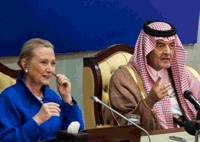
US, Gulf states urge timeline for Syria plan
Dubai, March 31, 2012
The US and Gulf nations on Saturday pressed Kofi Annan, the UN-Arab League special envoy on the conflict in Syria, to set a timeline for Syrian President Bashar al-Assad to adopt a new peace proposal and put an end to violence against protesters.
'Given the urgency of the joint envoy's mission, (US and Gulf foreign ministers) urged the joint envoy to determine a timeline for next steps if the killing continues,' the US and the GCC said in a statement following a meeting in Riyadh.
The joint communique also called on countries 'with direct relations with the Syrian regime to join the international community in its efforts to solve the Syrian crisis'.
Syria has said the year-long revolt to topple Assad is over, but that it will keep its forces in cities to 'maintain security' until it is safe to withdraw in keeping with Annan's plan
During the meeting, Saudi Foreign Minister Prince Saud al-Faisal renewed calls to arm the Syrian opposition on Saturday, describing it as a 'duty.'
'The arming of the opposition is a duty, I think, because it cannot defend itself except with weapons,' Faisal said during a joint news conference with US Secretary of State Hillary Clinton.
Meanwhile, Syrian rebels said they were ready to stop fighting the moment the army withdraws its tanks, artillery and heavy weapons from opposition areas.
A spokesman for Free Syrian Army commanders inside Syria said on Saturday said that rebels taking part in the year-old revolt against Assad's rule are still sceptical the government will commit to a meaningful ceasefire.
But the statement from Lieutenant Colonel Qassim Saad al-Din was the first time any rebel commander has signalled a willingness to go along with a ceasefire plan proposed by United Nations-Arab League envoy Kofi Annan.
Annan has said the army should make the first move to withdraw from populated centres, but Syria says it must be allowed to maintain security.
'We cannot accept the presence of tanks and troops in armoured vehicles among the people. We don't have a problem with the ceasefire. As soon as they remove their armoured vehicles, the Free Syrian Army will not fire a single shot,' Saad al-Din told Reuters by telephone from Homs.
Homs has been the centre of armed rebellion against Assad, whose forces have cracked down fiercely on the unrest, including a heavy shelling campaign in the central city that killed hundreds.
It is unclear how much authority Saad al-Din, described as a spokesman for rebel commanders inside Syria, has over rebel units.
The FSA chain of command is weak and mostly localised. Top exiled leaders General Mustafa al-Sheikh and Lieutenant Colonel Riad al-Asaad were unavailable for comment.
A rebel officer in Damascus said he agreed in principle with Saad al-Din's view on the rebel response to the ceasefire plan.
'We don't really believe this is going to work, but in the unlikely case that Assad was to actually show good will by stopping this heavy siege of hotspots with tanks and shelling ... then our leaders can issue an order to stop operations and we will commit to it to show our good intentions,' the officer with Saif al-Haq Brigade said.
More than 9,000 people have been killed in the security forces' crackdown on an uprising that began as peaceful protests but turned increasingly bloody when armed rebels began to bring the fight to Assad's forces.
The government blames the unrest on foreign-backed militants and says around 3,000 security force members have been killed.
Syria has claimed victory over the opposition in recent days, saying 'the battle to topple' Assad was over. Days of heavy shelling have driven rebels from key positions in main cities, but they still launch hit and run attacks on the army.
Saad al-Din said opposition fighters were disappointed that the international community had not forced Assad to step down. But he said the rebels' willingness to follow the UN-backed ceasefire plan did not mean they had given up trying to end Assad's rule.
'When the army withdraws from the cities, the rebels will go back to their normal lives. But the world should know this means that the peaceful protests will return,' he said. 'Regimes eventually disappear but the people always remain,' he added.-Reuters







